Sep 3, 2024 Lecture at Royal Thimphu College, Meetings with Bhutan Tourism Council, Ministry of Agriculture, and Tarayana Foundation
Hello. Today, after completing the JTS workshop schedule, Sunim moved to Thimphu to give a lecture for university students and meet with Bhutanese government officials.
After finishing his early morning practice and meditation, Sunim departed for Thimphu at 5:30 AM. Dawn was just breaking. The beautiful Trongsa, shrouded in clouds, gradually receded into the distance.
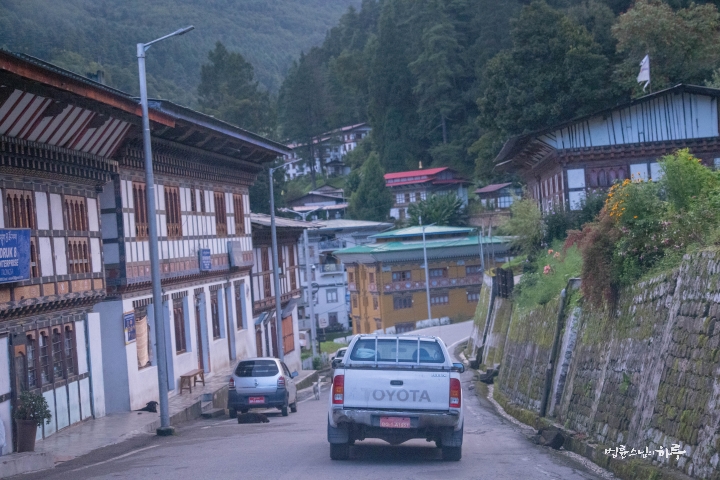
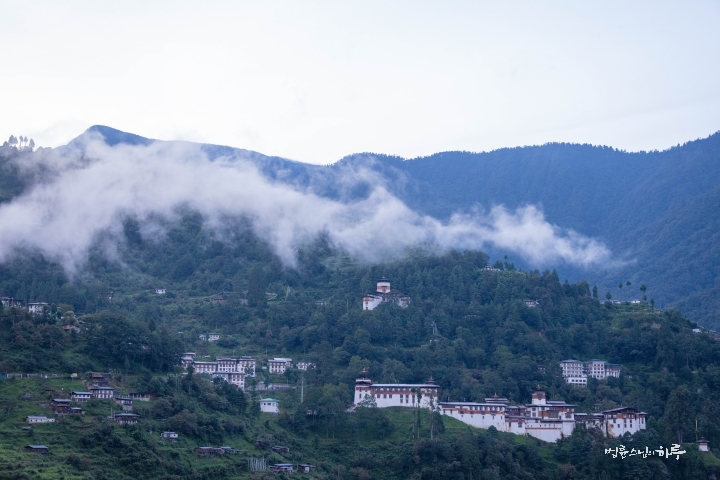
During the journey, Sunim briefly stopped at a restaurant for breakfast before continuing on the way.
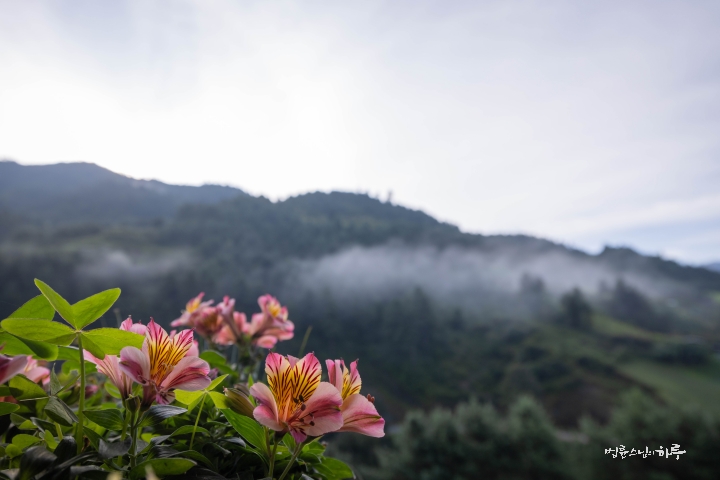
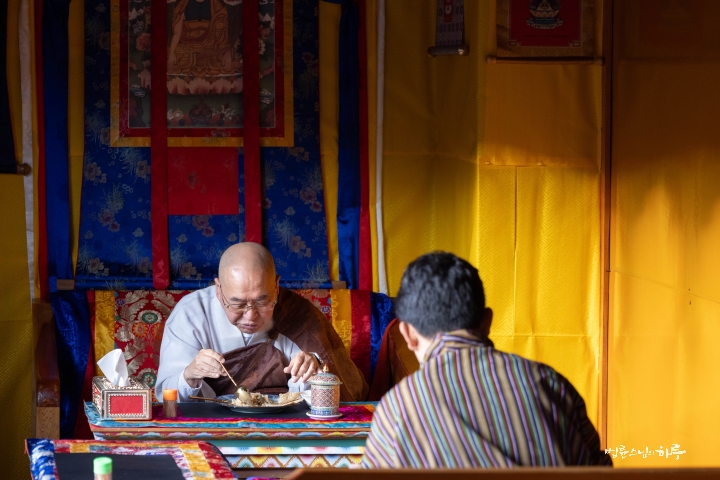
The route from Trongsa to Thimphu requires crossing two passes over 3,000 meters in altitude. Usually, these high passes at over 3,300 meters are shrouded in fog, but today the sky was clear, revealing the majestic Himalayan snow-capped mountains in the distance.
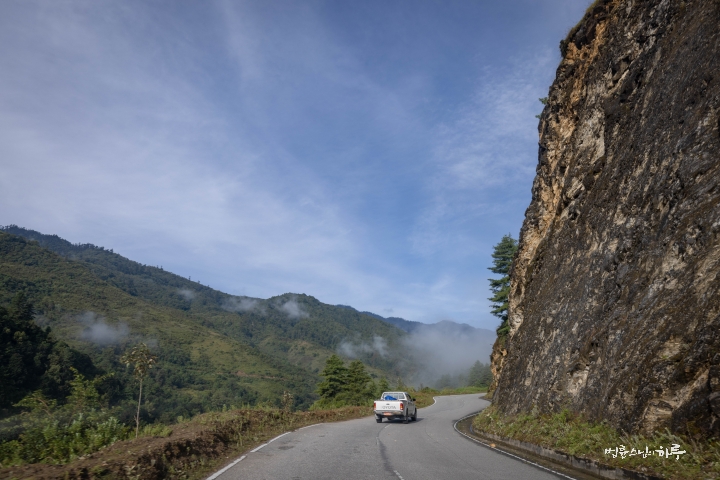
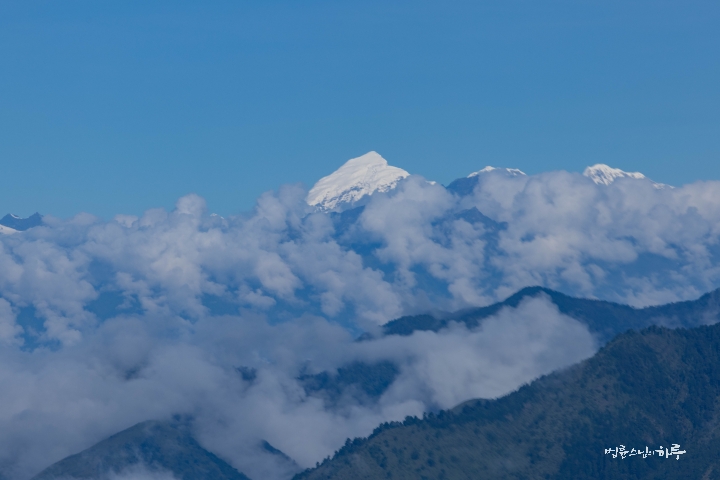
At 10:50 AM, Sunim arrived at Dochula, the second pass. Considering the driver’s well-being, Sunim briefly stopped the car and shared a cup of tea together.
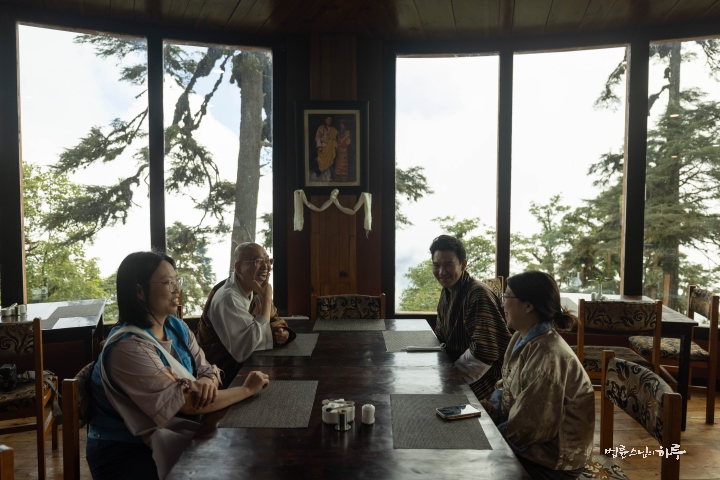
After getting back in the car and driving along the winding mountain roads, Sunim arrived in Thimphu at 11:30 AM. He unpacked at the home of Rinchen Dawa, who served as the interpreter during this Bhutan visit. After lunch, Sunim headed to the university for the lecture.
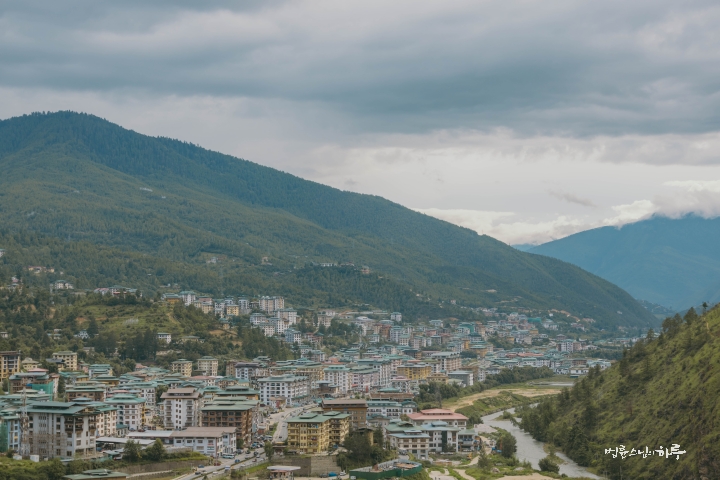
At 2:50 PM, Sunim arrived at the Royal Thimphu College. As he got out of the car, the dean and professors warmly welcomed him.
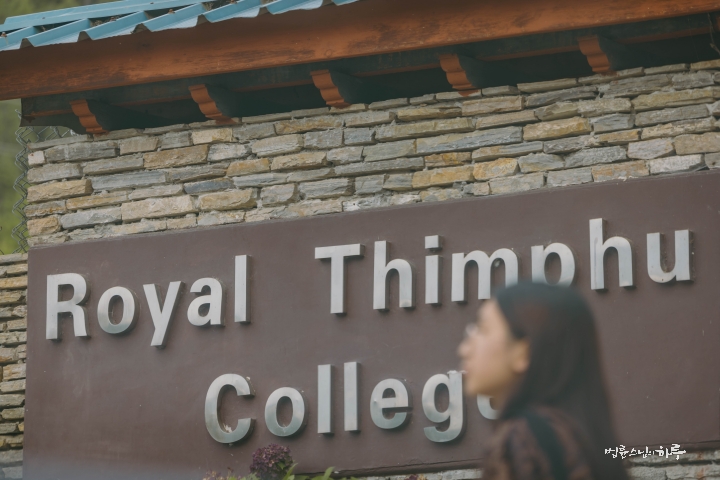
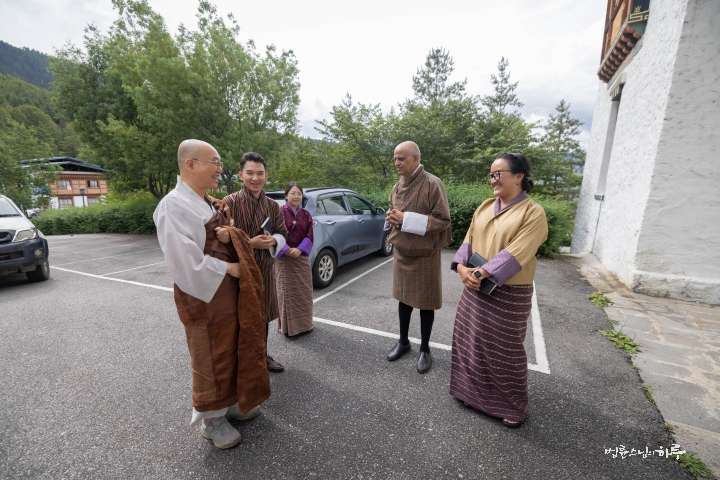
Before the lecture, Sunim went to the president’s office to have tea with the university president. The president expressed gratitude for visiting at such an opportune time.
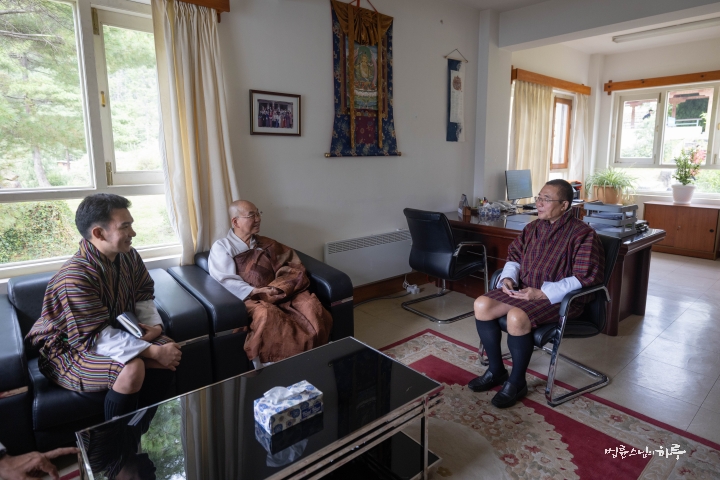
“Thank you for visiting us. This is the largest university in Bhutan. We have 1,900 students studying here. Through your lecture today, our students will learn a great deal. It is an honor for our school. We started the semester in August, so your visit comes at a very appropriate time.”
“Thank you.”
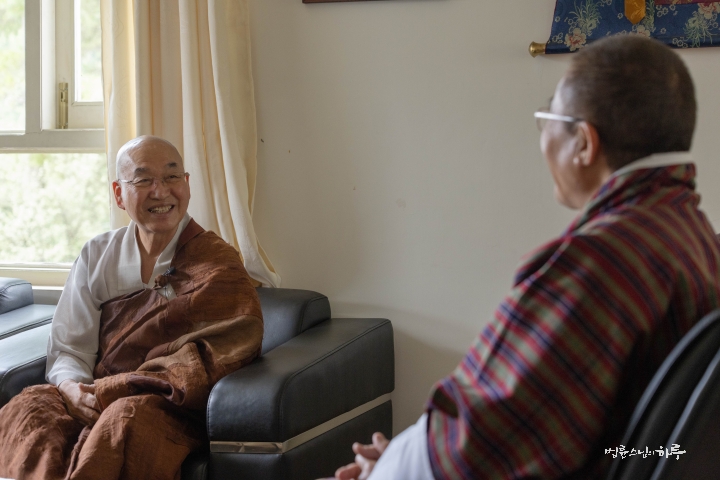
As it was time for the lecture to begin, they moved together to the auditorium. Students who had finished their classes were entering the auditorium in small groups. With over a thousand students filling the seats, Sunim began his greeting.
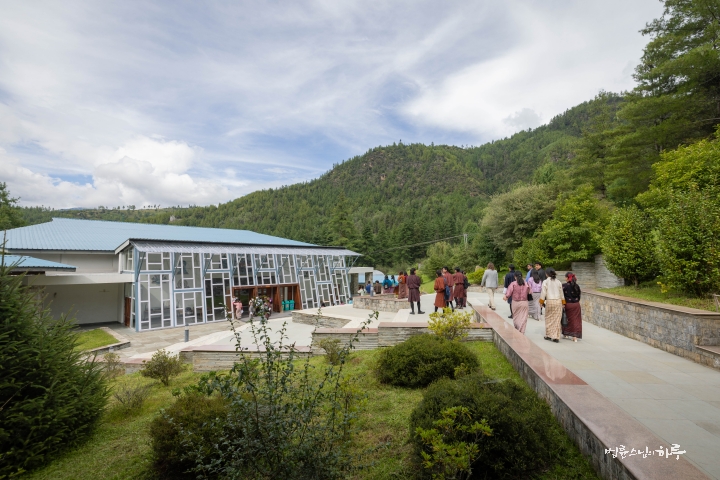
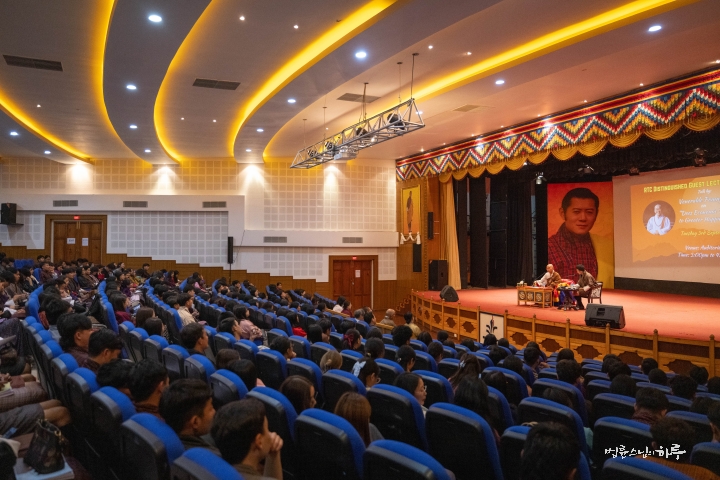
Sunim spoke about the climate crisis, consumerism, and the Gross National Happiness (GNH) index, explaining why he came to Bhutan and what kind of life he hopes the young people of Bhutan will lead.
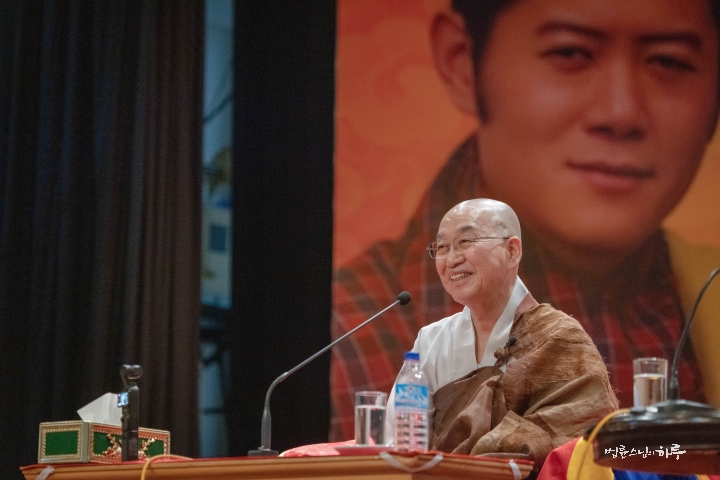
“Do you all know a little bit about what kind of country Korea is?”
“YES!”
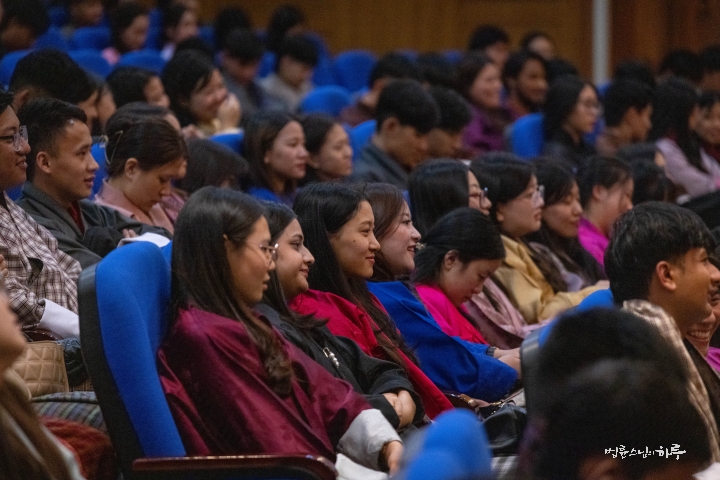
“Until now, we have used the material production index as a measure of prosperity, believing that ‘producing more and consuming more means living well.’ The population of OECD member countries, which we call developed nations, is only about 1.2 billion. However, believing this path is correct, China and India are now following suit. Each of these countries has a population of 1.4 billion. In other words, while the development of advanced nations alone has already caused significant damage to the global environment, if China, India, and other countries all follow this path, the current climate crisis will worsen exponentially and become uncontrollable.
The consequences of our efforts to live well are increasingly becoming a reality that could lead to our collective demise. Despite this, we are unable to stop and are rushing even faster towards the cliff of mutual destruction. You have already joined this race. That’s why you’re all in a hurry to move from rural areas to cities, and from cities to foreign countries like Australia or Canada. When you visit rural areas, you’ll find that only the elderly remain, while the number of young people is rapidly decreasing.
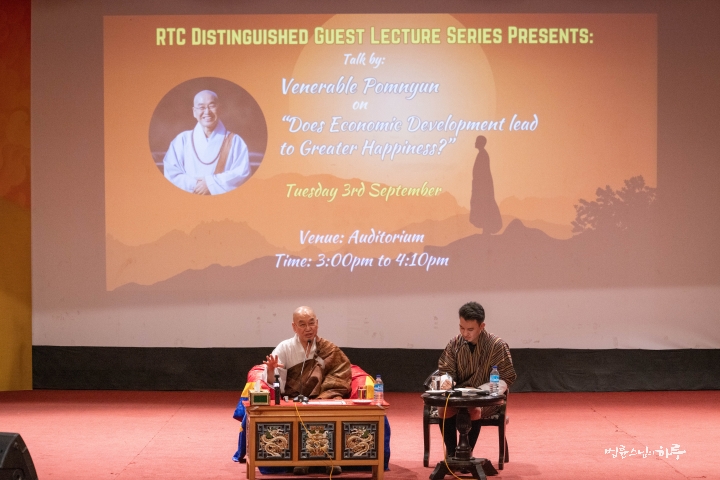
People Rushing Towards the Cliff of Mutual Destruction
What I want to convey to you is that using this ‘material production index’ as a standard for living well can no longer be a source of hope. Although Korea’s material index has greatly increased compared to the 1960s, people’s happiness index hasn’t risen significantly. Moreover, this direction in life is now causing a survival crisis for all life on Earth. So what should we do now? We need to consider whether we should continue on this path, stop, or find a new way.
There’s a story in the scriptures that compile Buddha’s teachings. Many animals lived in a forest. Suddenly, these animals began to run in a certain direction, one by one. The first to start sprinting was a rabbit. Seeing this, a deer asked:
“Where are you going?”
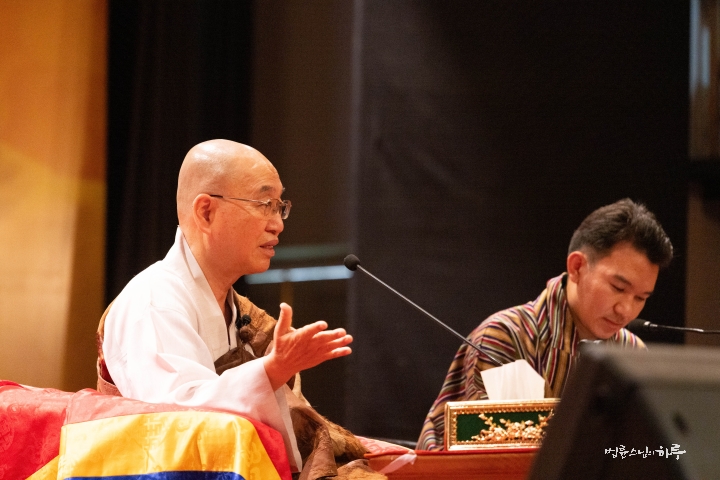
The rabbit shouted that the sky was falling and the earth was sinking.
“Really?”
“Yes, really!”
So the deer started running too. A cow nearby asked the deer:
“Why are you running so fast? What’s happening?”
“They say the sky is falling and the earth is sinking!”
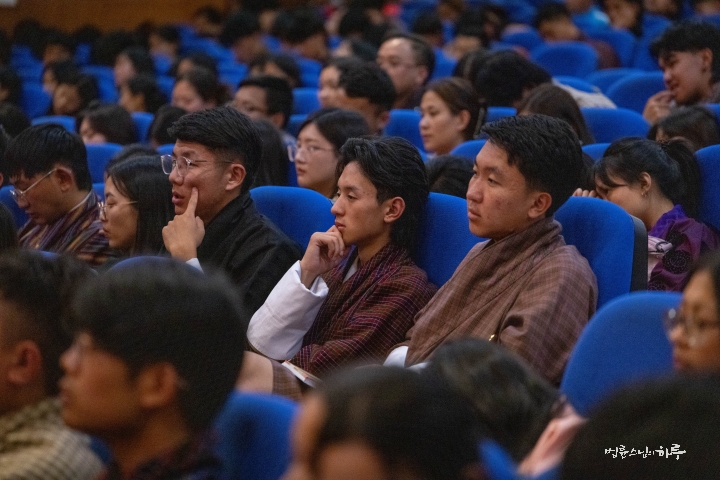
This way, all the animals in the forest began to run, one after another. However, at the edge of the forest, there was a big cliff. If left unchecked, they were all in danger of falling off the cliff to their deaths. But no one could stop them. At that moment, the lion, the king of the forest animals, roared loudly, “Roar!” All the animals stopped in surprise. Then the lion asked:
“Where are you going?”
“I don’t know.”
“Then why are you running like that?”
“The cow was running, so I followed.”
“Why was the cow running?”
“The deer was running, so I followed.”
As he kept asking, it finally came to the rabbit who ran first.
“Why did you run, rabbit?”
“I heard the sound of the sky falling and the earth sinking, so I ran.”
“Where did you hear that?”
So they took the rabbit to that place. It was under an acorn tree. Upon closer inspection, they found a single acorn that had fallen. The rabbit had been taking a nap and was startled awake by the sound of the falling acorn. In the scripture, the lion-like being is likened to the Buddha. And the forest animals are compared to foolish sentient beings. These beings are constantly running without knowing where they’re going.
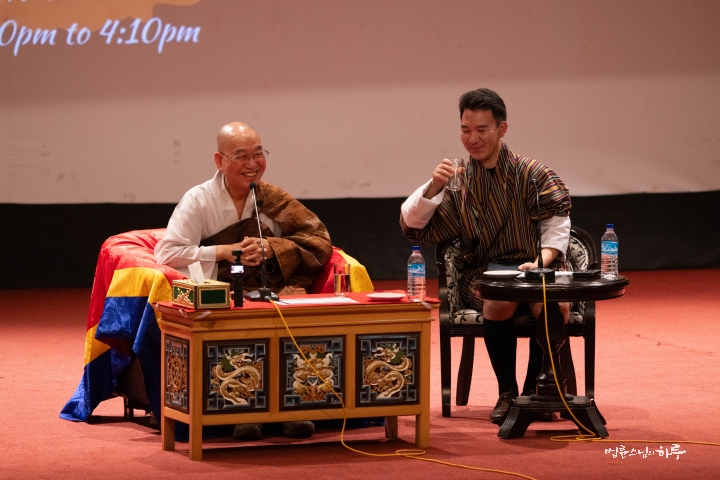
To Create a New Civilization to Overcome the Climate Crisis
Perhaps the current state of humanity, where we think that producing and consuming more means living well, and everyone is racing ahead of each other, is similar to the animals in the scripture. Just as the lion stopped the animals with a loud roar and revealed the cause of their rush to save them from danger, the Buddha is the one who enlightened us that this path leads to destruction and showed us the path of liberation from suffering. The Buddha said 2,600 years ago that following material desires is never the path to true freedom and happiness.
The concept that best expresses this teaching of Buddha in modern society is the GNH (Gross National Happiness) index proposed by the 4th King of Bhutan. Twenty years ago, when it was suggested that ‘it is not right to set the standard of living well based on material indices; it should be evaluated by a happiness index,’ people didn’t pay much attention. Some even scoffed, saying, “Can you be happy if you’re poor?” However, with the advent of the climate crisis, people’s thoughts have changed dramatically. Now, if we don’t find a way to be happy while consuming less, we won’t be able to overcome this climate crisis. In the past, when governments invested, they focused on ‘how much production effect will this investment have?’ But now, in New Zealand, they are using ‘how much happier will this investment make our citizens?’ as an evaluation criterion. This change can be a new hope for us.
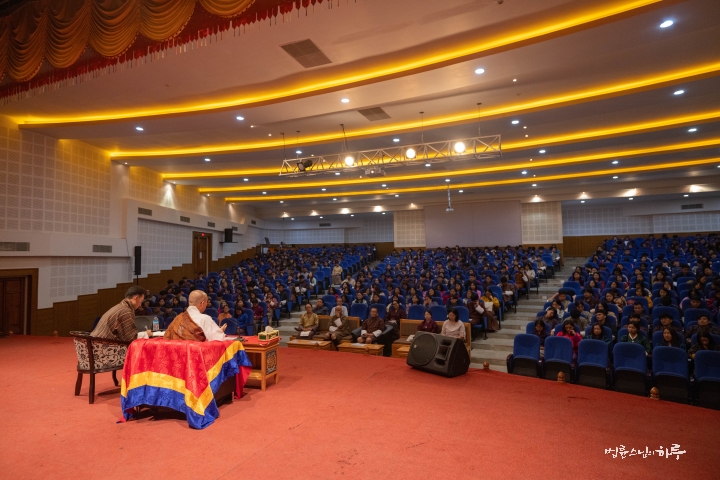
Unfortunately, when I came to Bhutan, I saw that even in Bhutan, where this concept should be realized, people were rushing towards material indices. The reason I wanted to meet and talk with you like this was to ask, ‘Are we going to blindly follow the developed countries, or are we going to create a new civilization that can overcome the climate crisis?’
From a development-centered perspective, the least developed countries are defined as underdeveloped. However, from an environmental value perspective, the undeveloped state has the highest environmental value. Therefore, instead of following in the footsteps of developed countries, why don’t we find a new path that preserves environmental values and leads humanity?
That’s why I came to Bhutan. I’m currently trying to create a model for sustainable human life in the climate crisis era by going to Zhemgang, the most underdeveloped area within Bhutan. If you’re interested, I’d like to work with you to establish the GNH (Gross National Happiness) concept that preserves Bhutan’s values in our human society. It might seem like a ‘useless effort’ now, but as the climate crisis worsens, the model we create could become a new hope for humanity.”
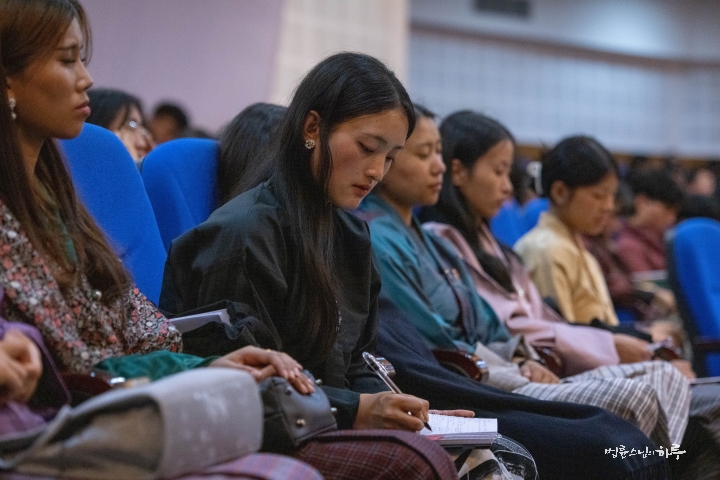
Then, Sunim took questions about curious points. Hands shot up everywhere as students asked questions. One student asked about North Korea.
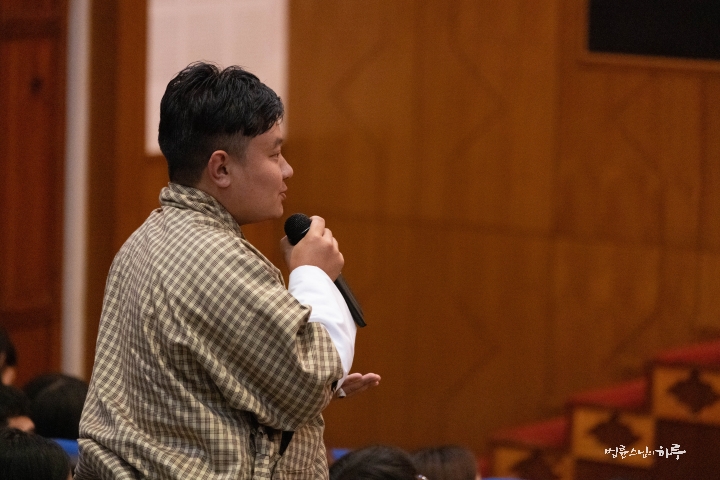
Is North Korea a Very Poor Country with Severe Dictatorship?
For the past 30 years, I have been providing humanitarian aid to North Korea and helping North Korean refugees in China. However, from the Chinese government’s perspective, these refugees are considered illegal immigrants, so helping them is deemed illegal. Some of our volunteers have been arrested by Chinese authorities, detained, and then deported.
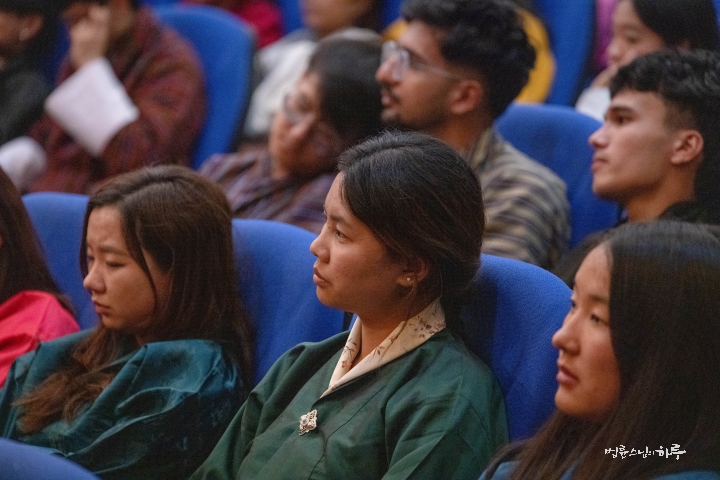
North Korea is still facing a food crisis. Although it’s not as severe as before, there are concerns about another food crisis due to massive flooding a month ago. Particularly, as military confrontation and tension between South and North Korea intensify, South Korea is unable to provide support, and North Korea is refusing to accept aid. So, we are currently in a situation where we can’t do anything.
Unfortunately, the content of the question is true. However, rather than just criticizing the political system, we should prioritize providing aid and support to the people living there without discrimination.”
Another student asked about “what would have happened if the lion had followed other animals” in reference to the earlier discussion about Bhutan needing to be a lion. As Sunim was answering this question, it was already time to conclude the lecture. Regretfully, but promising for next time, the lecture ended with a big round of applause.
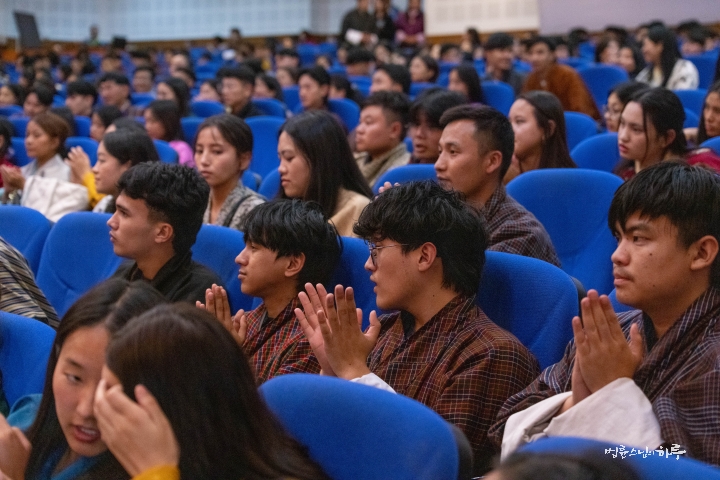
After the lecture, Sunim moved to the president’s office to have tea again with the president. The president expressed interest in the sustainable development work Sunim is doing and asked if he was also involved in the Gelephu new city development.
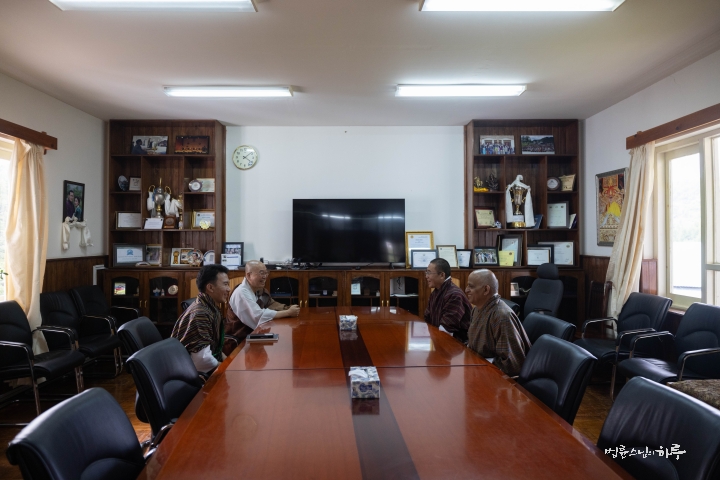
“The King of Bhutan is promoting the development of Gelephu new city. Are you also supporting this project?”
“No, I don’t oppose new city development, but I don’t support it either. I mainly support preserving environmental values and improving the lives of the extremely poor. This is because economic support helps increase happiness when people are poor. However, this support doesn’t continue indefinitely. Therefore, the sustainable development that JTS is doing in Bhutan is different from general relief activities. That’s why we started a village development project in Zhemgang province, which has the highest poverty rate. We plan to do sustainable development in the entire regions of Zhemgang and Trongsa for five years.”
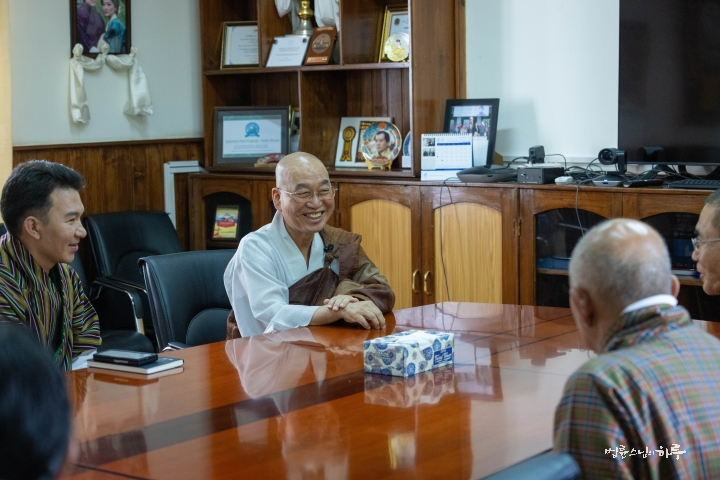
Sunim then explained in detail about the purpose, methods, and targets of sustainable development currently being carried out in Bhutan. The president asked again.
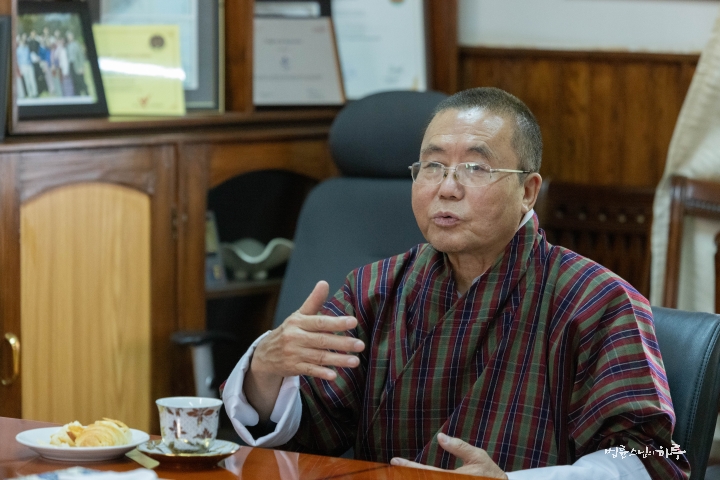
“Your principles and perspectives are excellent. Are you providing scholarships to students in the Zhemgang region who want to go to university?”
“I believe people should strive to go to university on their own. If someone can’t attend elementary school, I support them unconditionally in such cases. Even in earthquake-affected areas or conflict zones, if there’s no elementary school, I provide support anywhere in the world.”
As it was time for the next appointment, Sunim stood up. The president gave Sunim a gift for giving a free lecture to the students. After taking a commemorative photo in front of the school, they left Thimphu University.
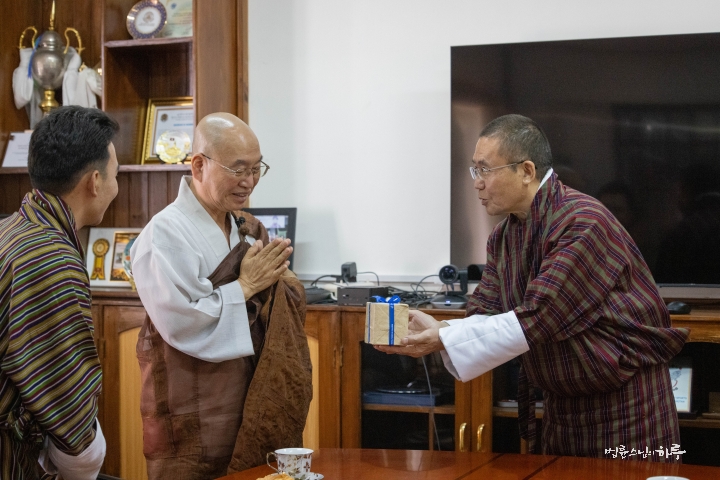
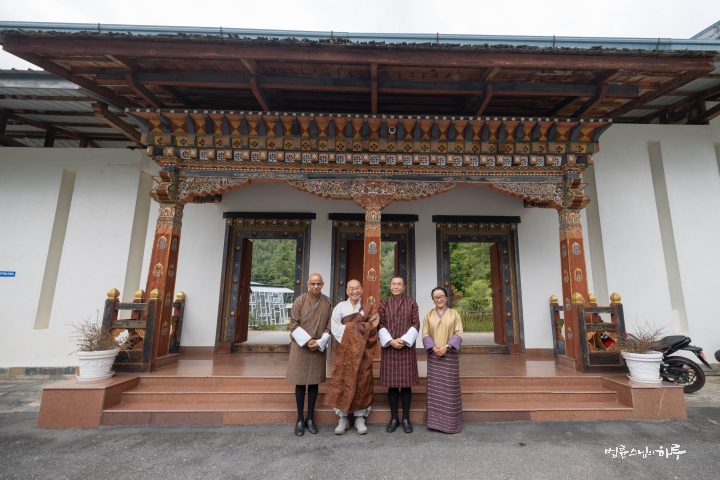
They got in the car and headed to the Tarayana Foundation to meet with tourism officials. The tourism office was on the first floor of the foundation.
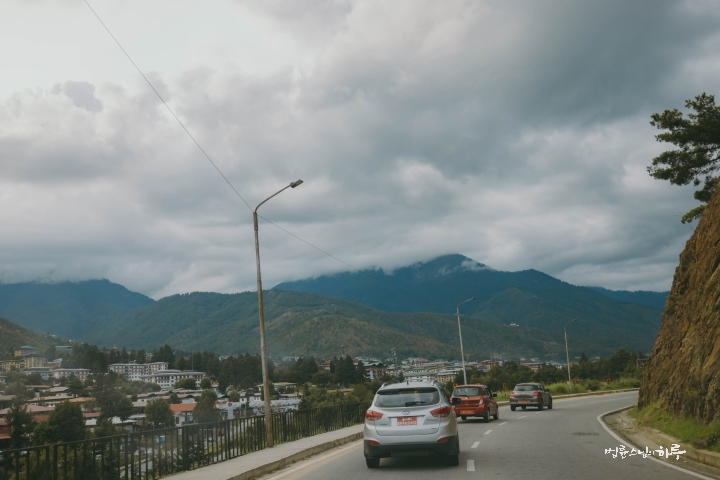
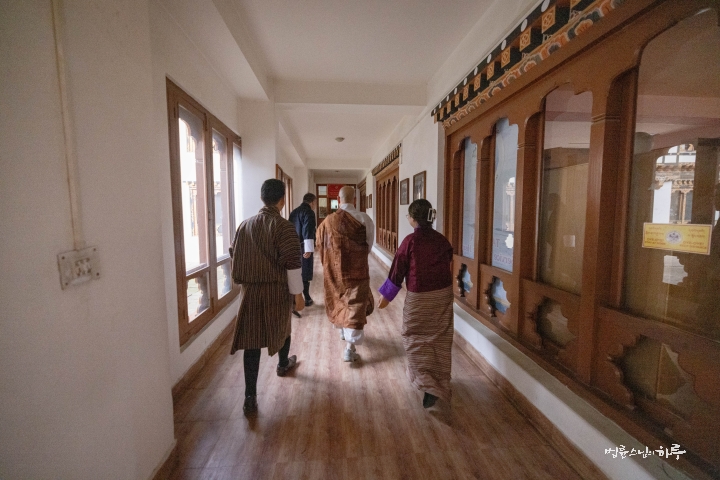
Sunim had an hour-long conversation with the deputy head of the tourism office on the topic of improving tourism infrastructure. Currently, about 100,000 tourists visit Bhutan, and they are implementing many policies with the goal of expanding this to 300,000. Sunim shared some opinions about Paro Taktsang Monastery, the most famous tourist attraction in Bhutan.
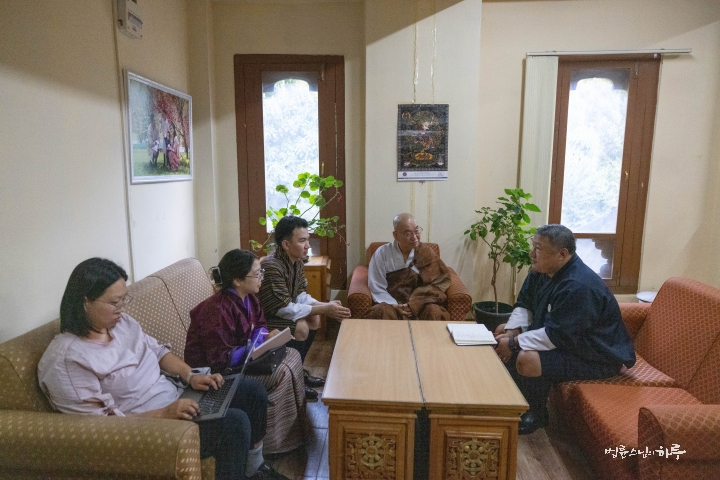
“It seems that with Bhutan’s current tourism infrastructure, it will be difficult to handle the increasing number of tourists. If you want to increase tourists, you need to improve the infrastructure first.”
Sunim then shared many ideas about tourism policies, parking lots, parks, and preservation of sacred sites, using Paro Taktsang Monastery as an example.
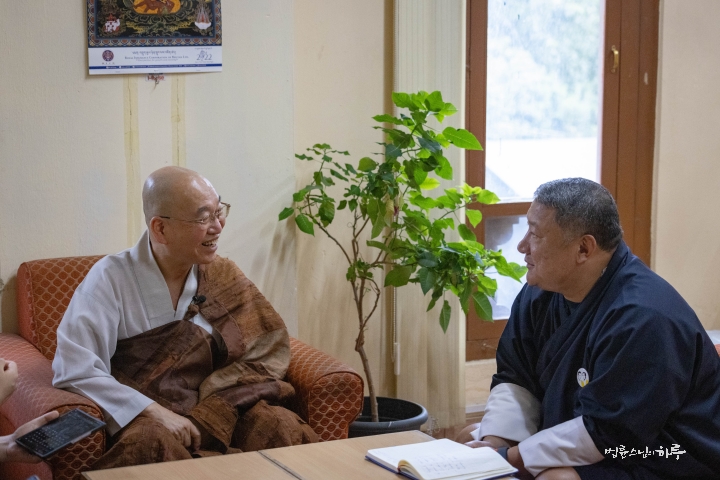
At the end of October, they agreed to bring experts from Korea, including environmental experts, national park experts, garden experts, and designers, to conduct a survey and explore improvement measures, and then cooperate with relevant departments.
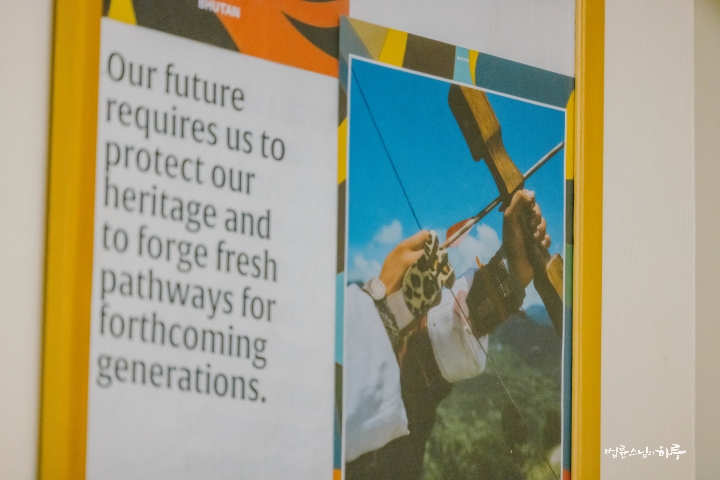
Next, they went up to the second floor of the foundation and from 6 pm, Sunim met with officials from the Bhutan Ministry of Agriculture. Sunim shared the contents of the workshop he had with officials from Trongsa and Zhemgang over the past three days and asked a few questions about Bhutan’s agricultural policies.
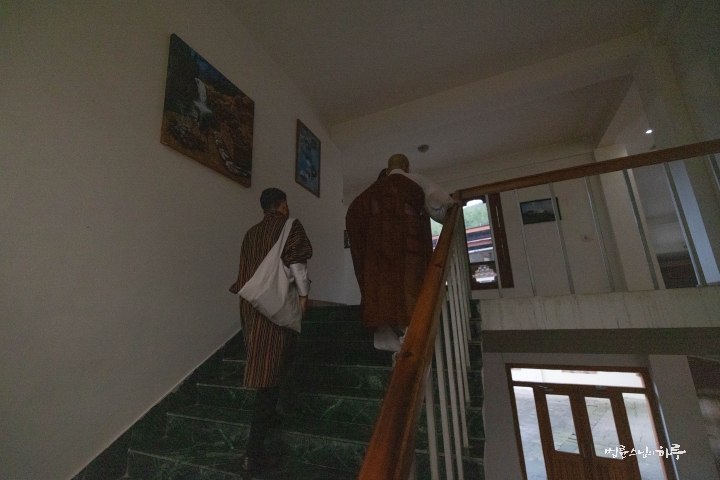
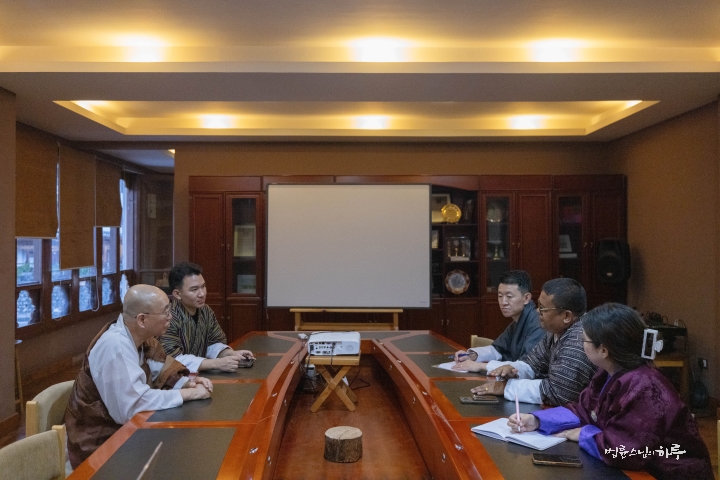
“As I’m doing regional development in Zhemgang and Trongsa, I need to know what Bhutan’s agricultural policies are. This is because JTS has a principle of supporting residents with what the government doesn’t support.”
Sunim then asked one by one about what support the Bhutanese government is providing and what support it cannot provide for various issues that villagers have complained about, such as fruit tree seedling support policies, livestock support policies, and policies for changing the use of rice fields and dry fields.
“The Bhutanese government says they can provide support, but when I ask the residents, they say they don’t get any support. In such cases, can I contact you to confirm?”
“Yes, I will do that.”
They agreed to keep in frequent contact whenever there are inquiries in the future and concluded the meeting.
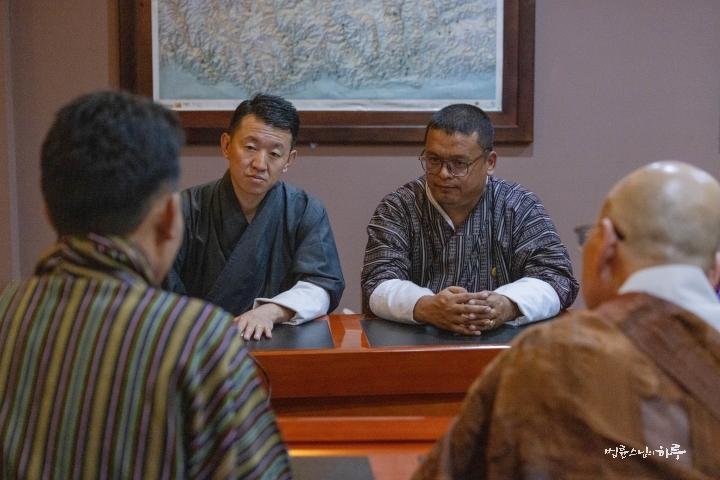
Immediately after, Sunim had a brief meeting with the deputy secretary of the Bhutanese royal family, followed by a meeting with the Tarayana Foundation from 7 pm.
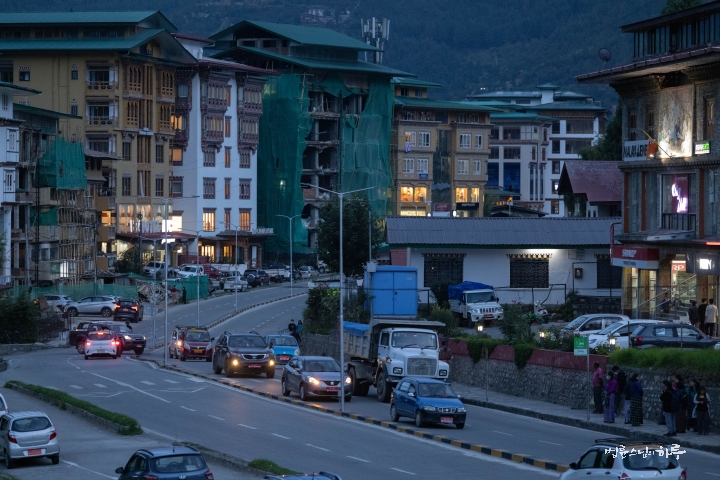
The Tarayana Foundation is an organization that carries out poverty eradication projects centered on rural areas. Among various projects such as housing construction for the homeless, providing drinking water, installing toilets, generating income from handicrafts, and microloans, they have prioritized housing improvement and have built or repaired over 2,600 houses so far.
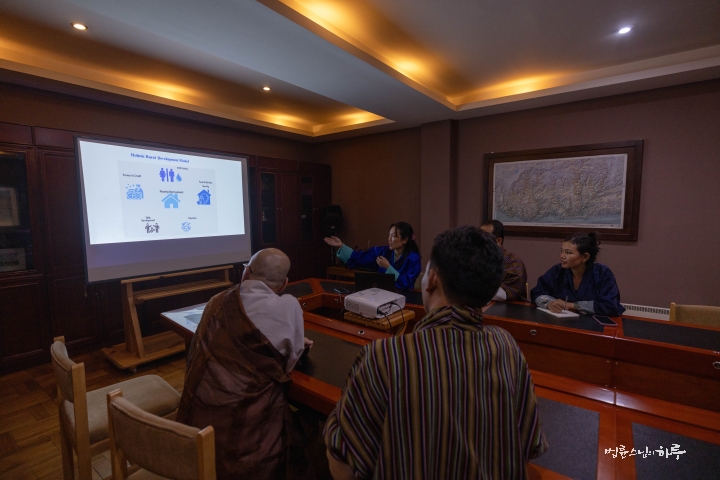
The foundation officials explained in detail to Sunim about the progress of the housing improvement project, how priorities are determined, and the achievements so far, and then made a proposal to Sunim.
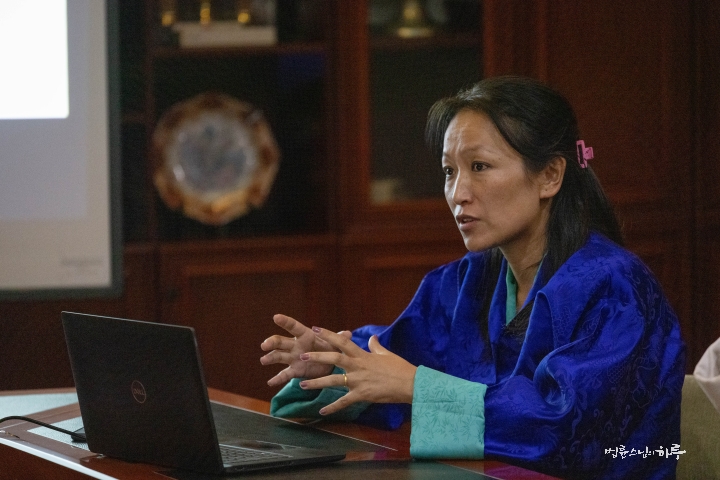
“Our foundation fully agrees with the sustainable development method that Sunim is implementing in Bhutan, so we would like to collaborate with you. The government’s free support policy had limitations in making people dependent, and especially, it took too long for the government to make decisions. We agree with your philosophy, so we hope you will contact us whenever you are interested.”
Sunim explained that while Tarayana Foundation and JTS have similar perspectives and do similar work, there are some differences, and he explained what sustainable development JTS is doing.
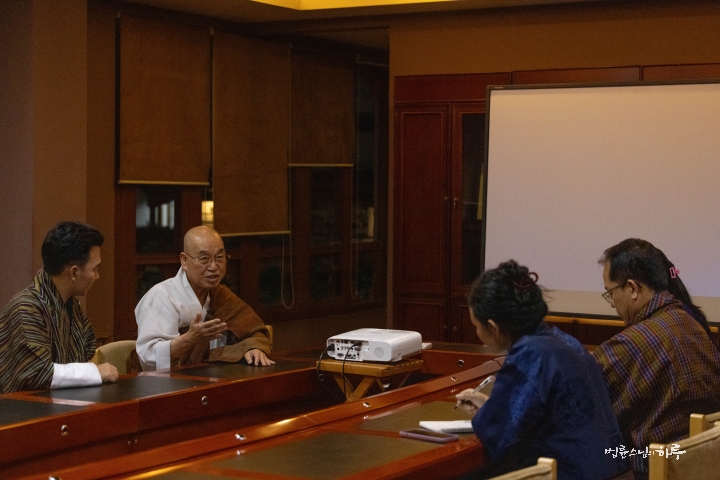
“JTS’s activities to eradicate hunger, disease, and illiteracy in Southeast Asia and West Asia are very similar to what the Tarayana Foundation does. From this perspective, JTS and Tarayana Foundation have similar business directions, so there seems to be a lot of areas where we can cooperate in the future.
How Is It Possible to Live Happily While Consuming Less?
However, the sustainable development project that JTS is currently carrying out in Bhutan has some differences from this. First, more important than helping those in need is the environmental perspective of ‘sustainable development’. As the environmental crisis worsens and it becomes impossible for people to live, we are trying to create a new model that people around the world might think, ‘Maybe we can go live in Bhutan?’
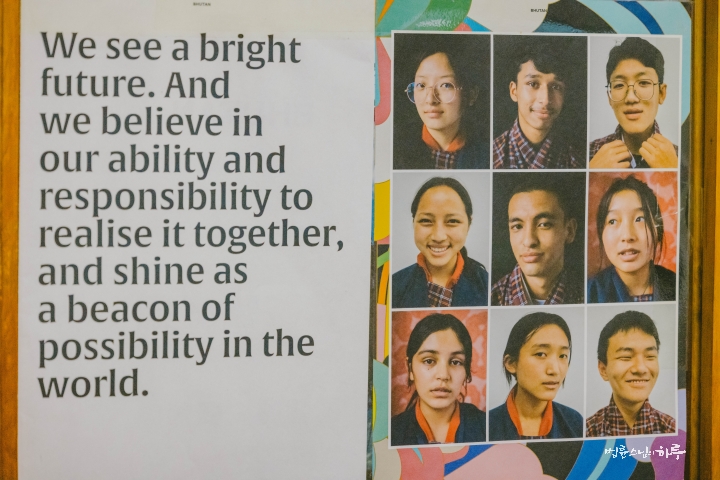
‘How is it possible to have a minimum level of satisfaction while consuming less?’ JTS is deeply researching this issue and carrying out projects. We cannot live fulfilling all our desires. Buddha taught us the path to true freedom and happiness by letting go of those desires. Not only ordained monks but when all people have such a perspective, we can create a new civilization that can overcome the current climate crisis. Buddha ate by begging, wore discarded clothes, and slept under trees. Even if it’s difficult for us to live like Buddha, at least the basic problems of food, clothing, and shelter should be solved. Also, we should be able to live independently without help from others. When people from developed countries come here and live, they should change their thinking to ‘It’s a bit inconvenient, but there’s electricity, good air, clean water, and leisure in life, so it’s okay to live like this!’ This is how we can create a new civilization that responds to the climate crisis.
In this way, the minimum living conditions must be met. The goal is not development, but we only develop to the minimum extent necessary for human survival. We do not get involved in any further demands. Of course, in terms of results, there is no difference in helping the poor. However, the difference is that we do not encourage their desires and ensure that they become self-reliant. So, JTS focuses on these two issues: the problem of the climate crisis and the teachings of Buddha Dharma.
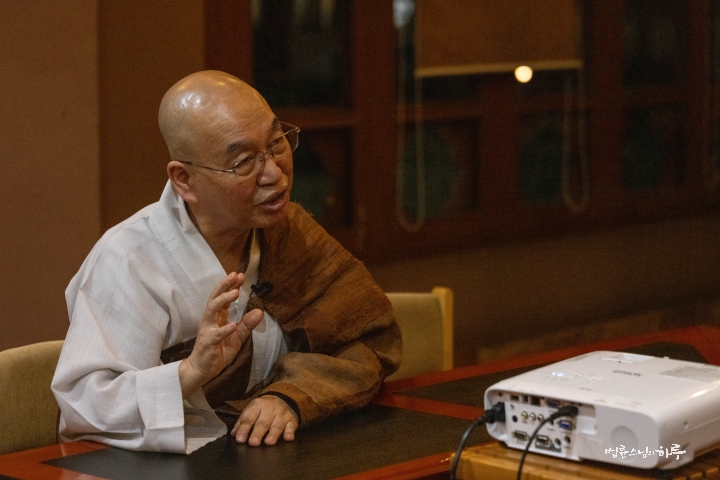
And JTS is not simply building houses for individuals, but trying to improve the living conditions of all residents in one province. If there are no houses, we need to build them, and if the interior of the house is too poor, we need to improve it. However, it’s a bit different from general NGO activities. For example, the government takes on large projects like bringing water 5km from the water source, while JTS cooperates with villagers on aspects like laying waterways for each field within the village. In other words, we play a role in complementing what the government does.
Since this is also the first attempt for JTS, we continue to research, change, and supplement as we progress. I will brief you on the results after conducting a pilot project until May next year.
While the projects are similar in terms of building houses for the poor, JTS is slightly different in that it looks at an area comprehensively before proceeding. And whether it’s three years or five years, we first conduct a pilot project, and if this method proves to be very effective, we plan to expand it to the entire Bhutan. When we reach that stage, I believe this work should be done by the Bhutanese government.
Residents want the government to step in and do everything. Initially, we planned for JTS to give the project funds to the government and for the government to take the lead in this project. However, if the government does it, the residents will become passive and rely on the government for everything, so I suggested that we proceed with a separate budget. So we told the villagers that the cost of this project is the Lama’s money, not the government’s. Then the residents said, ‘Since the Lama is helping, we will work harder’ and are participating very actively.”
Sunim then explained in detail about the targets, methods, and purposes of sustainable development.
After listening to Sunim’s explanation, the Tarayana Foundation activist said that if the results don’t match the Sunim’s hard work and efforts, they would feel very sorry for the Sunim.
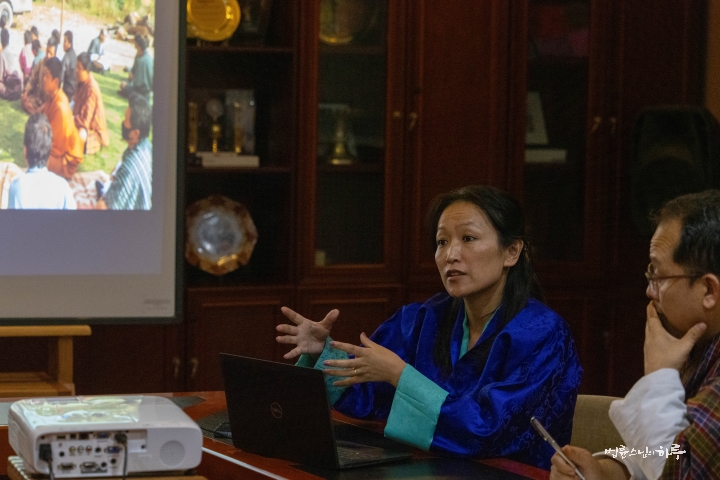
“Sunim, the Bhutanese government takes a long time to do anything. This is because there’s too much work and too few people in the field. And I feel sorry and apologetic that there might not be as much achievement as you think, given how much you’re striving for the Bhutanese people.”
Sunim smiled and replied.
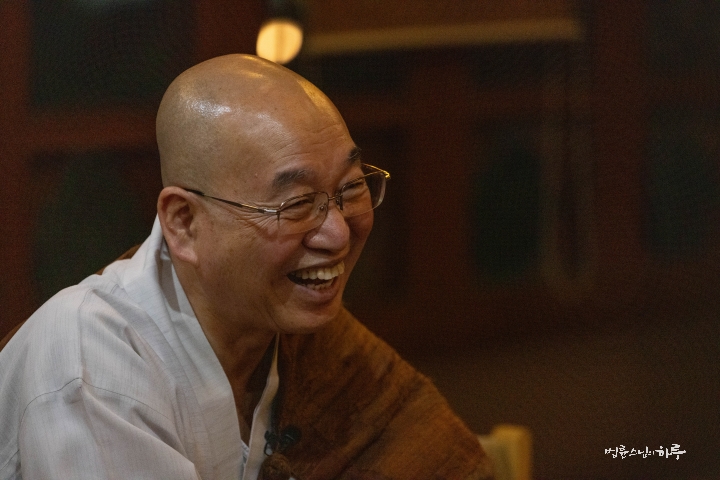
“It’s alright. I don’t really worry much about whether things work out well with the government or not. This is because I understand that it’s not easy for salaried government officials to have such dedication.
Not Just Building Houses, But Changing People’s Mindsets
However, for Bhutan to develop in the future, government officials need to change. So, I’m carrying out this project while observing whether the mindset of government officials can change. In fact, while officials in Bhutan may seem problematic within the country, when compared to officials in other countries, Bhutan’s officials are actually quite good. In another country, it’s impossible to cooperate with officials in this way. After talking a lot with the officials over the past three days, I saw hope.
First of all, all the officials are Buddhists. They all chanted well too. So, I emphasized the need to save public funds and said this:
‘This budget is tax money paid by the Bhutanese people. It’s not the government’s money, but the Lama’s money. The Lama’s money is Buddha’s money, so if you misuse this money, you’ll face serious consequences. Buddha is always watching, so you must use it very transparently and wisely.’
They quickly understood why they needed to save money. Being a monk gives me a bit of an advantage in this way. (Laughs)
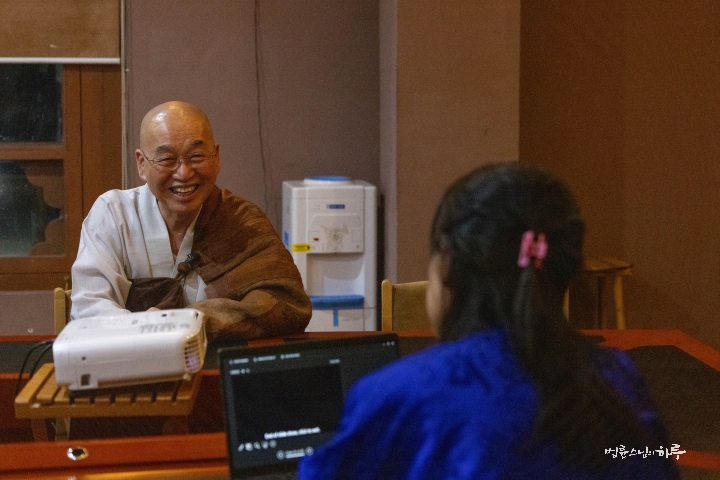
Two professors I met in the U.S. have already suggested that we should collaborate with the Tarayana Foundation, so I’m keeping that in mind. However, my goal is not to build houses, but to change the thinking of government officials and people’s consciousness. So, at this point when we’re starting this project, we can’t work with other NGOs. I hope you understand this point. After I conduct a pilot project, I will request cooperation from the Tarayana Foundation if necessary.”
“Thank you. Please contact us anytime.”
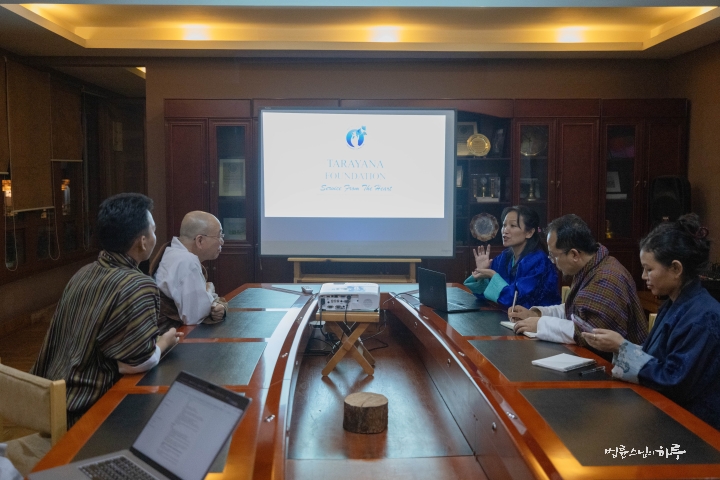
After an hour-long conversation, we concluded the meeting, agreeing to keep in touch and cooperate in the future.
After leaving the Tarayana Foundation, we briefly stopped at Sanmaru, a Korean restaurant. Originally, we had made a reservation to have dinner with the central government officials who had accompanied us on the site visit, but the appointment was canceled due to successive meetings. We had a late dinner of simple porridge and salad, returning to our lodging just before 9 o’clock.
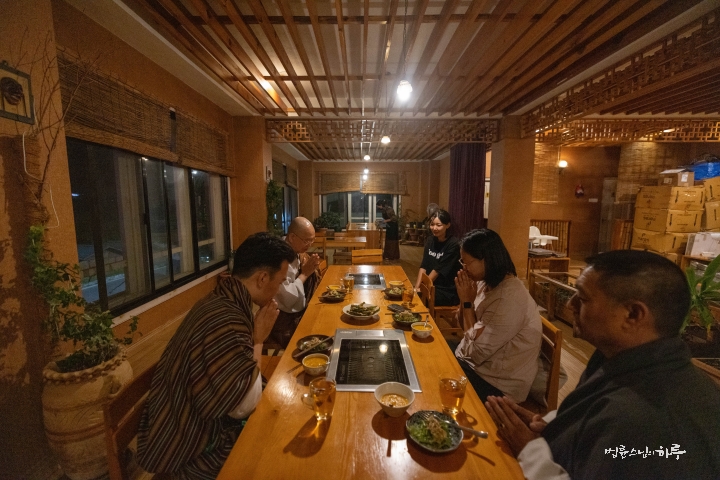
Today’s accommodation is at the home of Rinchendrawa, who is serving as our interpreter. Sunim went to bed after proofreading manuscripts and handling various tasks.
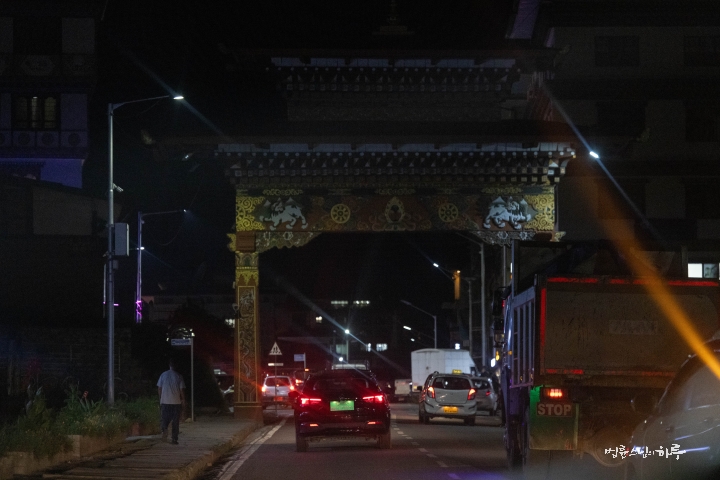
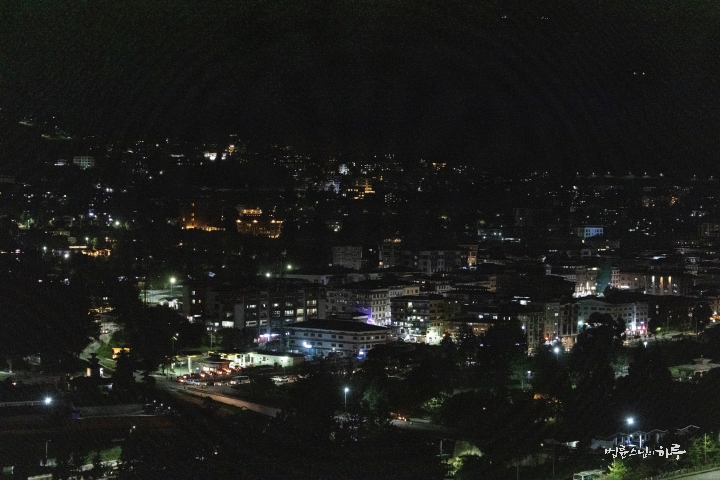
Tomorrow’s schedule begins with a live broadcast of the practice assembly at dawn. In the morning, Sunim will visit a Sangha university and temple in Thimphu. At lunch, he will meet with a cabinet minister of the Bhutanese government for discussions. In the afternoon, he will depart from Paro Airport, transit through Bangkok Airport, and in the evening, board a flight to Sydney to begin his lecture tour in Oceania.




